Seoul National University’s Institute for Future Strategy (IFS) is a policy think tank that conducts research, formulates, and proposes strategies that are critical in constructing a better tomorrow, not only for Korea as a nation but for the benefit of the international community. IFS strives to see beyond the “now” to anticipate and prepare for a diverse range of future challenges. As such, it currently comprises seven research clusters that address a crucial range of social, economic, and environmental issues, including those directly concerning the global health emergency of COVID-19.
On February 23, IFS hosted the fifth lecture of its Pandemic Cluster series, led by guest speaker Jerome Kim (M.D.). In addition to being a medical doctor by training and a professor, Kim is the Director General of the International Vaccine Institute (IVI), a nonprofit organization dedicated to vaccine research, development, and delivery for the betterment of global health. The accompanying discussant and moderator were Eun Hwa Choi (M.D., Professor, Department of Pediatric Infectious Diseases) and Jae-Joon Yim (M.D., Professor, Department of Pulmonary and Critical Care Medicine).
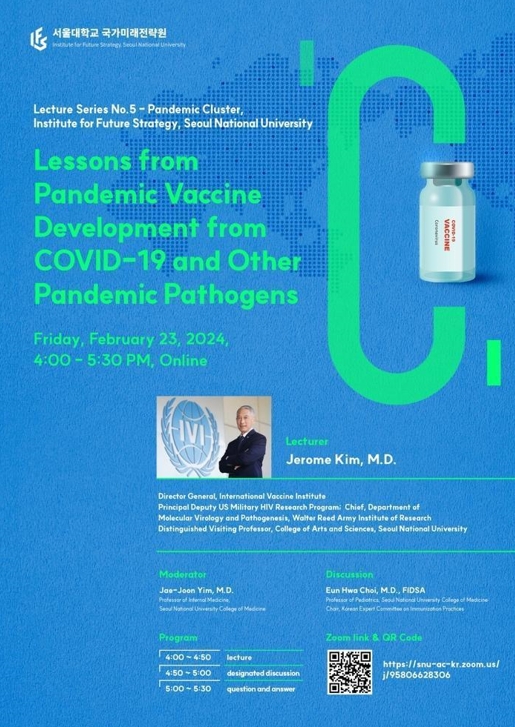
Institute for Future Strategy Lecture poster
SNU and the International Vaccine Institute (IVI)
Kim began by providing a brief introduction to IVI and its relations with SNU. IVI was founded at the initiative of the United Nations Development Programme (UNDP) and currently consists of 44 member states and the WHO as a state party. Its headquarters, with cutting-edge research facilities, are situated on SNU’s Gwanak campus, and several regional offices are scheduled to be opened all across the globe. In just the past year, a joint agreement was signed by the university and IVI to expand collaboration in vaccine research and development; in doing so, the two institutions are striving towards realizing their shared vision: speedily increasing access to safe and effective vaccines in low- and middle-income countries.
Lessons Learned from COVID-19 Vaccine Development
Kim divided the key findings and realizations made through the harrowing years of COVID-19 and pandemics of the past and present into 16 invaluable lessons. He presented those acquired from or highlighted by the most recent global pandemic to be the following.
First and foremost, according to Kim, the response to COVID-19 was an unprecedented demonstration of how “crisis spurs innovation.” This global emergency was an era that brought about many firsts: the development of new vaccines—such as the mRNA and DNA vaccine—and the introduction of regulatory pathways that allowed rapid approval of these creations. Going hand-in-hand with this lesson, it was made clear that funding is precisely what realizes rapid innovation; only with accessible funding “may innovation be translated into impact.”
The timeline for vaccine development and distribution is a testament to these truths. The appearance of COVID-19 led to the publication of a sequence by Chinese researchers within the first week of January 2020. By the end of the same month, the Coalition for Epidemic Preparedness Innovations (CEPI) issued the first in a series of grants to 5 different organizations for the development of vaccines. The United States alone invested 23 billion dollars into Operation Warp Speed. Thus, by April 2020, the first set of vaccines were subject to human clinical testing, and within 11 months, vaccines for COVID-19 were approved for emergency use.
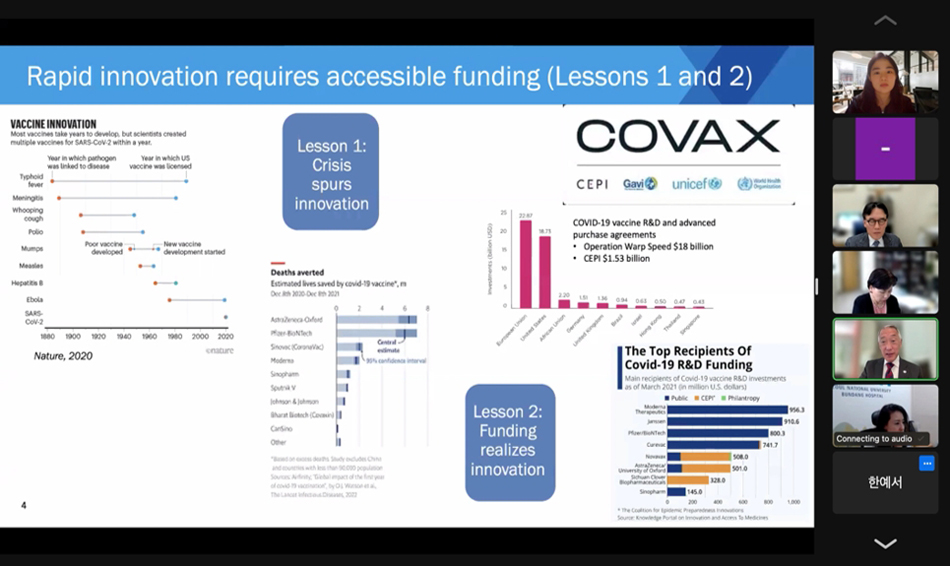
Rapid innovation requires accessible funding
What is more, the pandemic taught us that scaling up to produce billions of doses of vaccines can be made a reality. Statistics state that 13 billion doses of vaccines for COVID-19 were produced in just the year 2021. Equity, on the other hand, is much more difficult to achieve. By January 2021, some countries around the world began to administer vaccinations, and in a year’s time, many countries had a 100% vaccination rate. When January of 2023 rolled around, much of the world had received at least one dose if not more. Yet, in stark contrast, most countries in Africa were struggling to catch up. As recounted by Kim, “Seventy percent of the population in low- and middle-income countries are yet to receive a single dose.” Considering the production and supply of vaccines, it becomes apparent that inequity in access is a choice and requires rectification. Even when disregarding the dire consequence of mortality, people who remain unvaccinated are much more vulnerable to Long COVID and its associated plethora of health complications.
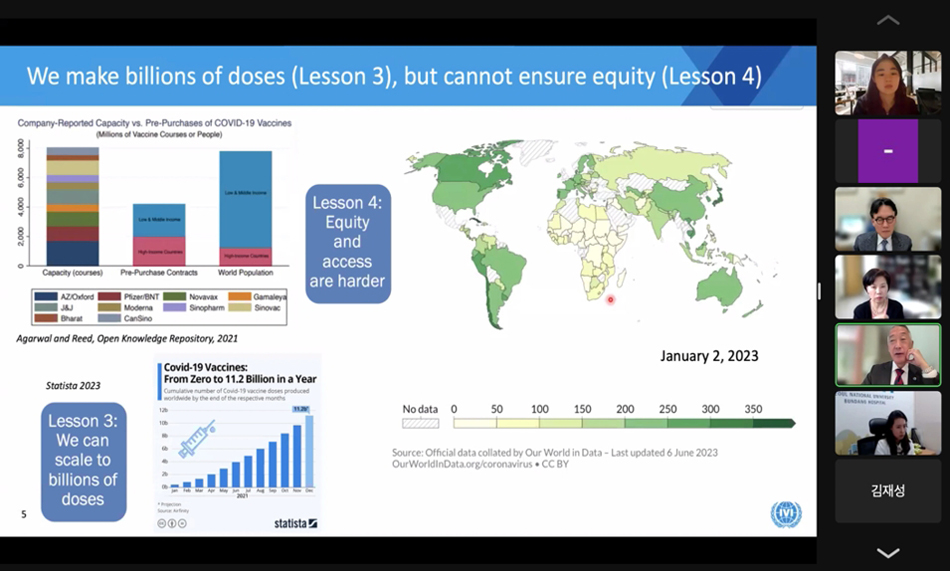
We make billions of doses, but cannot ensure equity
Lessons Learned from the Ongoing Cholera Pandemic
As stated by Kim, improving the quality of water, sanitation, and hygiene is indeed a “definitive solution” to preventing cholera and other health crises. If that is the case, however, why is there a need to vaccinate? According to the United Nations Educational, Scientific, and Cultural Organization (UNESCO), attaining universal access to safe drinking water and sanitation in 140 low- and middle-income countries requires an estimated hefty cost of 114 billion dollars annually. However, the countries most affected by such diseases are also the ones that are least able to produce the money needed to improve conditions. This is where vaccines become a critical factor. The cholera vaccine, which is only 50% efficacious, has an effectiveness of 80% following mass vaccination in a city by virtue of herd immunity. In other words, vaccines provide a presently attainable solution to health crises and “do not need to be perfect to help.”
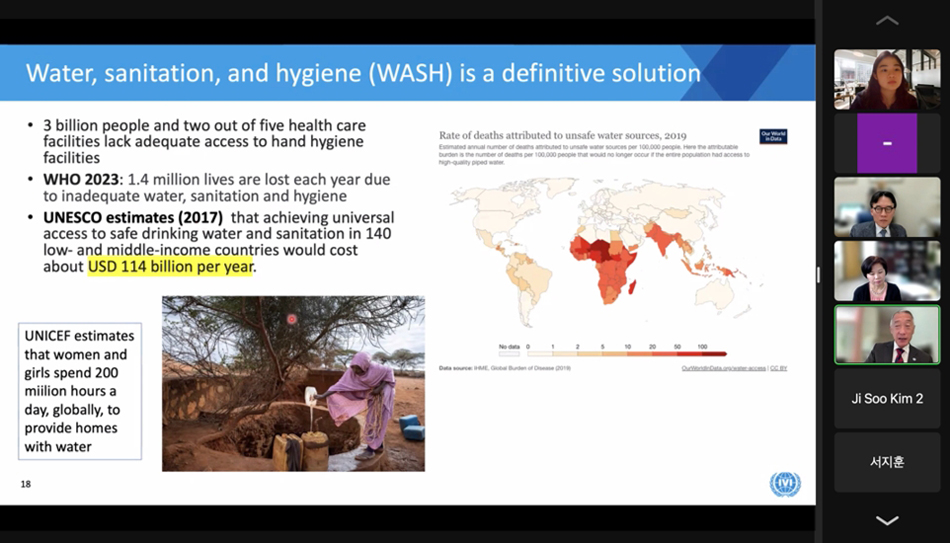
Improving the quality of water, sanitation, and hygiene is a definitive solution
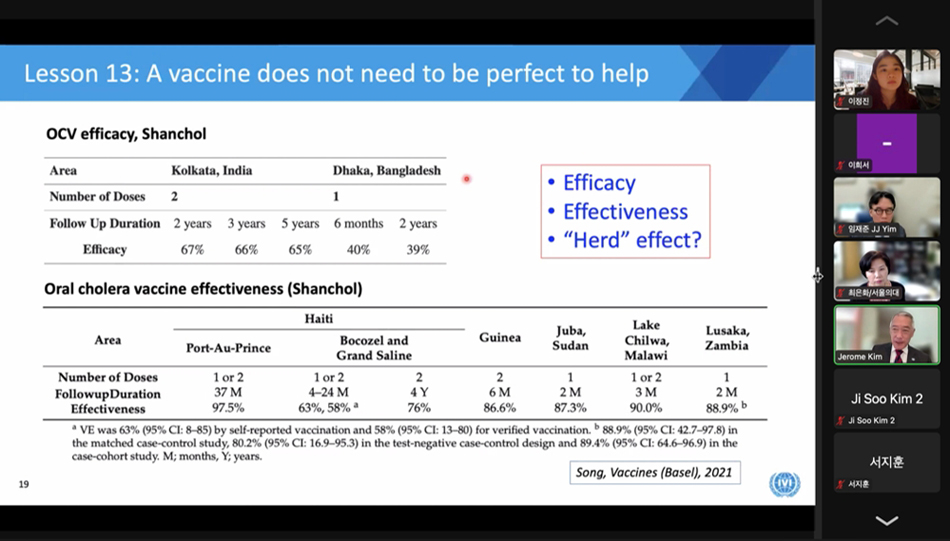
A vaccine does not need to be perfect to help
In concluding his lecture, Kim asserted once more that global health sits at an intersection with all the other challenges faced by humankind. Addressing and improving global health through increased access to vaccines worldwide will most certainly produce a large ripple effect that benefits our strides in sustainable development.
Written by Hee Seo Lee, SNU English Editor, heeseolee@snu.ac.kr

